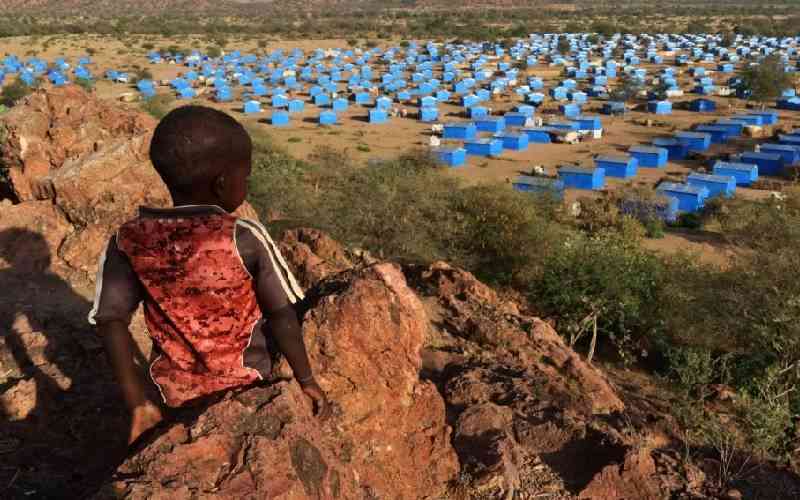
A United Nations report finds nearly 11 months of conflict in Sudan has resulted in mass killings, displacement, destruction of property and rampant human rights violations that have caused immeasurable harm and distress to millions of people, whose plight has been all but forgotten by the rest of the world.
“The crisis in Sudan is a tragedy that appears to have slipped into the fog of global amnesia,” Volker Turk, U.N. high commissioner for human rights, said during an interactive dialogue on the situation in Sudan at the U.N. Human Rights Council on Friday.
Turk presented a blistering and bleak assessment of life in Sudan since rival generals of the Sudanese Armed Forces and paramilitary Rapid Support Forces plunged the country into “a ruthless, senseless conflict” on April 15.
“They have manufactured a climate of sheer terror, forcing millions to flee,” he said. “And they have consistently acted with impunity and a distinct lack of accountability for the multiple violations that have been committed.”
He said the report highlights a range of gross violations and abuses committed by Sudan’s warring parties, noting that “many of these violations may amount to war crimes or other atrocity crimes.”
Since the war began, the United Nations reports, at least 14,600 people have been killed and 26,000 others injured. The U.N. refugee agency, UNHCR, reports the war has uprooted 8.1 million people from their homes — 6.3 million within Sudan and 1.8 million as refugees in five neighboring countries — making Sudan the largest displacement crisis in the world.
“Sudan is today facing one of the direst humanitarian crises in the world as a direct result of the armed conflict that started on 15 April,” said Hanna Serwaa Tetteh, U.N. special envoy for the Horn of Africa, adding that “18 million people face acute hunger and 25 million need humanitarian assistance.”
“The Sudanese population is bearing the brunt of a conflict at the heart of the military and security apparatus, that is, between the Sudanese Armed Forces and the Rapid Support Forces,” she said.
High Commissioner Turk said the war in Sudan was not being waged with just the use of fighter jets, drones, tanks and other heavy artillery.
“Sexual violence as a weapon of war, including rape, has been a defining and despicable characteristic of this crisis since the beginning,” he said, underscoring that his office has documented 60 incidents of conflict-related sexual violence, involving at least 120 victims across the country, mostly women and girls.
“These figures are sadly a vast underrepresentation of the reality. Men in RSF uniform and armed men affiliated with the RSF were reported to be responsible for 81% of the documented incidents,” said Turk.
He expressed concern about a rise in ethnically motivated killings, the fate of thousands of civilians held by both parties and their affiliates in arbitrary detention, and the conscription of child soldiers.
“My office has recently received reports of the RSF recruiting hundreds of children as fighters in Darfur and the SAF doing likewise in eastern Sudan,” he said.
He said he has received troubling reports of civilians themselves mobilizing under the new Popular Armed Resistance movement. “There are real fears this may result in the formation of an armed civil militia with no defined control, increasing the chances of Sudan sliding into a spiral of protracted civil war.”
These concerns were echoed by Special Envoy Tetteh, who said, “The most serious risk threatening Sudan is a de facto partition between the territories controlled by RSF and SAF.
“The international community should avert this risk of a de facto partition by supporting and facilitating a Sudanese-owned and Sudanese-led process addressing the root causes of the conflict,” she said, emphasizing the impossibility of two competing military forces co-existing.
Sudan’s minister of justice was clearly annoyed that the U.N. report seemed to equate the actions of the Sudanese Armed Forces with those of the Rapid Support Forces.
Justice Minister Moawia Osman Mohamed Khair Mohamed Ahmed said the SAF did not instigate the conflict but responded to an attack by rebels against a sovereign state.
“This was a conspiracy that took the national army off-guard,” he said. “This militia tried to take over the power by launching a full-scaled armed attack against the country using looting and burning of buildings.”
He accused the RSF of committing multiple atrocities across the country, saying that what they have done in Darfur “is beyond words.”
Ahmed said his government has started an investigation of crimes allegedly committed by the rebel forces, “particularly related to crimes of genocide, crimes of war, crimes against humanity and other crimes related to killings, rape and robbery.”
He appealed for international help to reinforce Sudan‘s “serious legal procedure in order to achieve justice and provide redress to the victims through the national mechanisms and international mechanisms.”
High Commissioner Turk said the international community also has a critical role to play to alleviate the suffering endured by the people of Sudan.
“Decades of turmoil and repression in Sudan preceded this crisis,” he said, “but nothing has prepared the people of Sudan for the level of suffering they face today.
“The fighting parties must agree to return to peace, without delay. The future of the people of Sudan depends on it.”